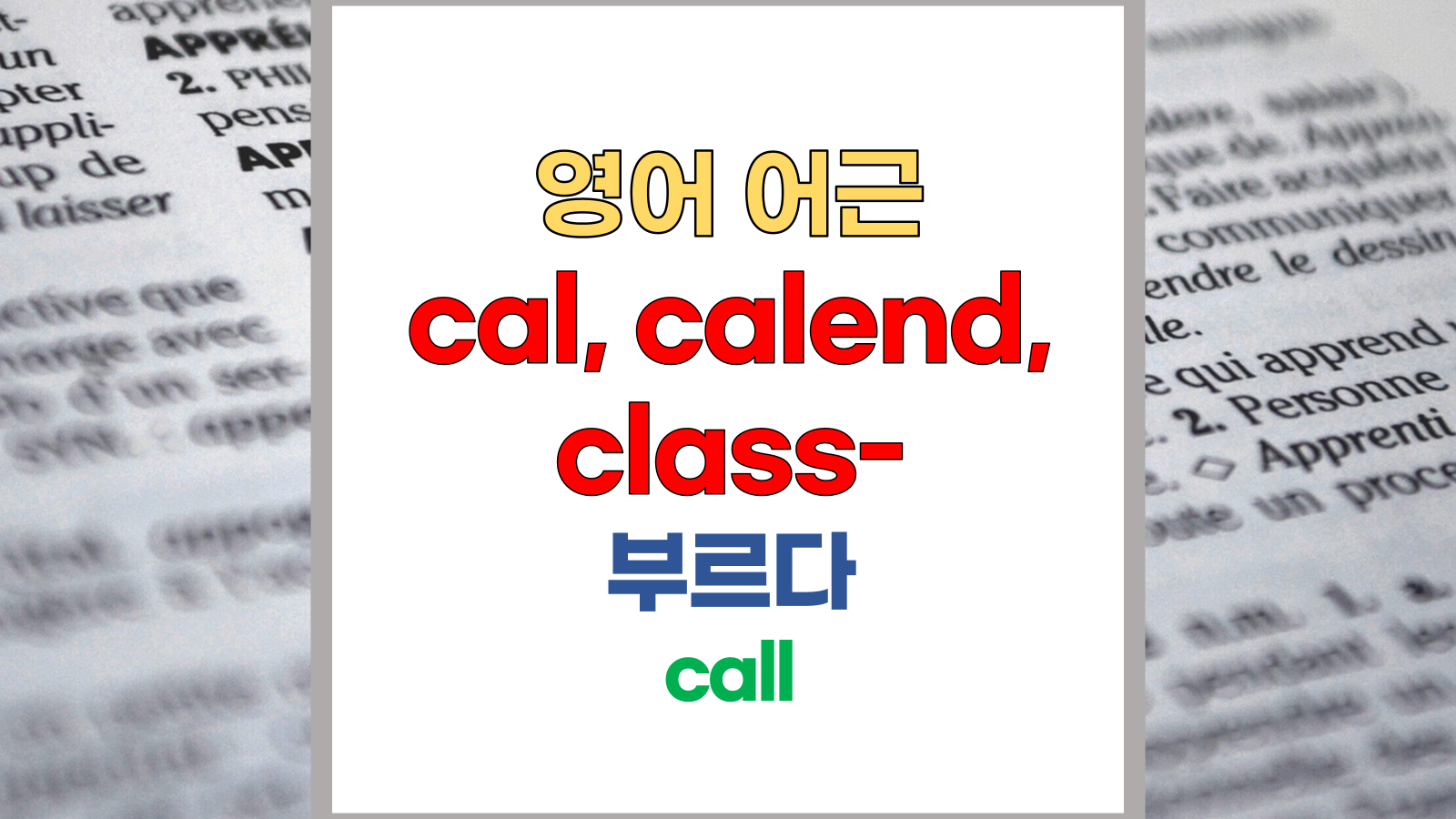[cal-, calend-, class- 어근이 포함된 중요 단어] calendar**, calendric△, calends△, class****, classic****, classical***, classically△, classification☆, classify**, classmate☆, intercalate△

[어근]어근 cal
[변이어근] cil, calends, class, classi, cill
[어원]어근 (라틴어) calare, classis, calendarium
[의미]어근 부르다, call
[상세 어근 내역]
- [Latin] sel- - [=sel] (발표하다, 소환하다, 부르다(소집하다))
- [Latin] calendarium - [from calendae, kalendae] account book (회계장부)
- [Latin] classis - [akin to calare] a class, a division; army, fleet, (especially) any one of the six orders into which Servius Tullius divided the Roman people for the purpose of taxation; (traditionally originally) the people of Rome under arms (학급, 부서, 부대, 함대)
| 영어 어근 cal-, calend-, class-는 라틴어(Latin) calare, classis, calendarium에서 유래했습니다. 부르다, call이라는 기본적인 의미를 갖고 있습니다. |
【어휘별 상세 정보】
| [영어단어 암기기준] ★★★★(기본암기: 상위 2,048이내) ★★★(필수암기: 상위 3,265이내) ★★(권장암기: 상위 4,465이내) ☆(추천암기: 상위 6,087이내) |
calendar noun ★★[4127] ← from [레마] calendar
[영한] ① 달력 ② 일정표, 일정 기록부 ③ 연간 주요 행사표 ④ 역법(曆法)
[굴절형] 복수형; calendars
[어근] ⑴ calend(cal); 부르다, call ⑵ ar; 명사 어미
[어원] 《프랑스말 calendier》 [from Latin calendarium] list, register
[최초 의미] the year as divided systematically into days and months
[파생] calendric, calendrical, calendar
calendric adj. △[10000+] ← from [레마] calendar
[영한] 달력의, 달력에 관한
[어근] ⑴ calend(cal); 초하루, 소리치다 ⑵ r(ar); 명사 어미 ⑶ ic; 형용사어미
[어원] 《프랑스말 calendier》 [from Latin calendarium] list, register
[파생] calendric, calendrical, calendar
calends noun △[10000+] ← from [레마] calendar
[영한] pl. [때로 단수 취급] (고대 로마 달력의) 초하루, 삭일(朔日)
[굴절형] 복수형 명사
[어근] ⑴ calend(cal); 부르다, call ⑵ s; 명사 어미
[어원] 《프랑스말 calendier》 [from Latin calendarium] list, register
[최초 의미] a day as reckoned back from the first of the following month
class noun ★★★★[559] ← from [레마] class(학급[부서])
[영한] ① 학급[반] (학생들) ② 수업 ③ (한 주제에 대한 연속적인) 수업[강좌] ④ (특정 해의) 동기생, 동기 동창생 ⑤ (사회의) 계층 ⑥ (사회적) 계급 (제도) ⑦ 부류, 종류 ⑧ 우아함, 탁월함 ⑨ -등급 ⑩ (영국 대학 학위 시험에서 성취 수준의) ?등급
[굴절형] 복수형; classes
[유의어] sort(부류), category(범주)
<동사> ① 분류하다(classify), 등급[품등]을 정하다 ② (학생을) 조(組)로 나누다, (학생을) …의 반에 두다 ③ 속하다, 분류되다 <형용사> ① 계급의, 계급적인 ② 학급의, 반의 ③ 우수한, 일류의, 품위 있는, 멋진
[어근] class(cal); 부르다, call
[어원] 《라틴어 classis》 학급, 부서, 부대, 함대
[최초 의미] group of students
[파생] classable, classer, classifiable, classification, classifier, classify, class
classic adj. ★★★★[1558] ← from [레마] classic 《 class(학급[부서])
[영한] ① 일류의, 최고 수준의 ② 전형적인, 대표적인 ③ (스타일이) 고전적인, 유행을 안 타는 ④ (비격식)
<명사> ① (책영화음악 등이) 고전, 명작 ② 전범, 모범 ③ 고대 그리스라틴학
[어근] ⑴ class(cal); 부르다, call ⑵ ic; 형용사 어미
[어원] 《라틴어 classis》 학급, 부서, 부대, 함대
[최초 의미] of or belonging to the highest class; approved as a model
[파생] classic, classical, classicalism, classicalist, classicality, classically, classicalness, classicize
classical adj. ★★★[2530] ← from [레마] classic 《 class(학급[부서])
[영한] ① 고전주의의, 고전적인 ② 고대 그리스/로마의 ③ (음악이) 클래식의 ④ 상호참조 classic ⑤ (언어가) 고어[고대]의(더 이상 일상생활에서 사용되지 않는) ⑥ 단아한
[구성단어] classic + al
[어근] ⑴ class(cal); 부르다, call ⑵ ical(ic); 형용사 어미
[어원] 《라틴어 classis》 학급, 부서, 부대, 함대
[파생] classic, classical, classicalism, classicalist, classicality, classically, classicalness, classicize
classically adv. △[10000+] ← from [레마] classic 《 class(학급[부서])
[영한] ① 고전적으로. ② 관행에 따라, 규범대로. ③ 고전 연구에 의하여.
[구성단어] classical + ly
[어근] ⑴ class(cal); 부르다, call ⑵ ical(ic); 형용사 어미 ⑶ ly; 부사 어미
[어원] 《라틴어 classis》 학급, 부서, 부대, 함대
[파생] classic, classical, classicalism, classicalist, classicality, classically, classicalness
classification noun ☆[5750] ← from [레마] class(학급[부서])
[영한] ① 분류 ② 유형, 범주 ③ (생물) (생물 분류에서) 문(門) ④ (도서관 자료의) 주제별 분류법
[굴절형] 복수형; classifications
[어근] ⑴ classi(cal); 부르다, 요구, call ⑵ fication; …화(하기)
[어원] 《라틴어 classis》 학급, 부서, 부대, 함대
[파생] classifiable, classification, classificational, classificatory, classifier, classify, class
classify verb ★★[3879] ← from [레마] class(학급[부서])
[영한] ① 분류[구분]하다 ② ~을 ~으로 분류하다
[굴절형] classified, classified, classifying, classifies
[유의어] sort out
[어근] ⑴ classi(cal); class, army ⑵ fy; 만들다
[어원] 《라틴어 classis》 학급, 부서, 부대, 함대
[파생] classable, classer, classifiable, classification, classificational, classificatory, classifier, classify, class
classmate noun ☆[5338] ← from [레마] mate
[영한] 급우, 반 친구
[굴절형] 복수형; classmates
[구성단어] class + mate
[어근] ⑴ class(cal); 부르다, call ⑵ mate; 친구, mate
[어원] 《중세 저지 독일어 mate》 =gemate;
intercalate verb △[10000+] ← from [레마] intercalate
[영한] ① 윤일[달, 년]을 넣다 ② 사이에 끼워넣다
[어근] ⑴ inter; between ⑵ cal; to announce ⑶ ate; 동사 어미
[그외 cal-, calend-, class-이(가) 들어가 있는 어휘 목록] classifier, classifiable, classicize, nomenclature, classer, classable, classicalism, classicalist, classicality, classicalness, classificational, classificatory
【다른 어근 보기】
cad-, cas-, cid-
broad
brev-
bal-, bel-, bol-
body
bio
bibli-, bibl-
bib-
bi
bene-, ben-
영어 단어의 상당부분은 그리스어, 라틴어, 프랑스에서 유래되었습니다. 이들이 영어로 유입되는 과정에서 다른 단어와 결합되고, 분화되면서 아주 많은 가족 단어들을 만들어 내었습니다. 따라서 이들 어근을 연구하면 상대적으로 영어단어를 쉽게 익힐 수 있습니다.
영어 어근은 크게 접두어, 연결어(어근) 그리고 접미어 등 세 그룹으로 나눌 수 있습니다.
어근(root)와 레마(Lemma): 단어가 갖는 가장 작은 단위의 요소는 어근입니다. 아근과 비슷한 개념 중에 레마(Lemma)라는 것이 있습니다. 어근은 많은 경우에 독립된 단어가 아닐 수 있습니다. 이에 비해 Lemma는 현재 실제 사용되고 있는 단어 중에서 가장 글자수가 적은 단어를 말합니다. 따라서 단어 암기에는 어근보다 Lemma가 더 효과가 큽니다.
|
(end)
'영어어근 > A레벨(Top5천 3개 이상)' 카테고리의 다른 글
| 영어 어근 cale-, cal- 주요 영어단어 - 어원은 (라틴어; calere, calor, caloris, calidus) (0) | 2024.07.06 |
|---|---|
| 영단어 어근 calc-, calcul-, cal- 주요 영어단어 - 어원은 (라틴어; calx, calcis, calculus, calculare) (0) | 2024.07.05 |
| 영어단어 어근 cad-, cas-, cid- 주요 영어단어 - 어원은 (라틴어; cadere, casus) (1) | 2024.07.03 |
| 영어단어 어근 broad 주요 영어단어 - 어원은 (고대 영어; brad) (0) | 2024.07.02 |
| 영어단어 어근 brev- 주요 영어단어 - 어원은 (라틴어; brevis, breve, breviare) (0) | 2024.07.01 |






